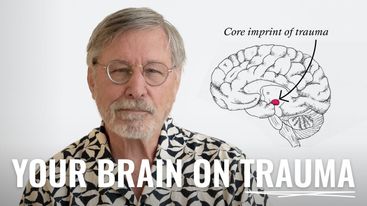Try psychedelics, access transcendence with Dr. James Fadiman
Expert James Fadiman explains how psychedelics have the power to expand consciousness, enhance creativity, and deepen our connections to the world. James Fadiman, a distinguished figure with over six decades in psychedelic research, examines the profound impact psychedelics have on consciousness, creativity, and connectivity. Fadiman shares insights into how these substances shift perception, offering perspectives that challenge and expand our understanding of reality. He also delves into the scientific underpinnings of psychedelics, their therapeutic potential, and the societal benefits of fostering deeper empathy and open-mindedness. Highlighting the importance of integration post-experience, Fadiman sheds light on the transformative power of psychedelics to not only alter individual consciousness but also to enhance community bonds and personal relationships. Through a focus on responsible use and the expansion of human awareness, Fadiman's expertise offers a compelling view into the capacity of psychedelics to redefine our interaction with the world and ourselves. About James Fadiman: Dr. James Fadiman is a leading scientific expert on the use of psychedelics for personal exploration, healing, and transformation. He has been researching, writing and lecturing on the topic for more than fifty years. His research focuses on exploring the potential of psychedelics to help individuals achieve a more meaningful, balanced and enlightened life. He has written numerous books on the topic, such as The Psychedelic Explorer’s Guide and Your Symphony Of Selves, and is widely considered to be one of the most influential figures in the field.
5:59 Series: The Science of Perception BoxRelated Videos [03]

Your Reality Narrows After Trauma — Here’s How to Expand It with Bessel van der Kolk
What if the way you see the world is shaped by trauma you haven’t fully processed? Psychiatrist Bessel van der Kolk, author of The Body Keeps the Score, explains how trauma isn't just remembered, it is physically lived and relived through the body and brain. He describes how traditional talk therapy often fails to reach the survival centers of the brain where trauma resides. Instead, healing comes through visceral experiences that help rewire perception, build a sense of safety, and reconnect the self. Through movement, touch, psychodrama, and even psychedelics, the brain can learn to see the present as safe again. About Bessel van der Kolk: Bessel van der Kolk, M.D., is a pioneering psychiatrist and trauma researcher, best known for his work on post-traumatic stress disorder (PTSD). He authored the bestselling book The Body Keeps the Score, which explores how trauma reshapes both body and brain. As founder of the Trauma Research Foundation, he has led innovative treatments combining neuroscience, psychotherapy, and body-based approaches to healing trauma. His work has transformed trauma care worldwide.
6:54 Series: The Science of Perception Box
Neuroscientist Nicole Vignola's Guide to Reclaiming Your Brain
Your brain is wired to repeat the familiar. Change this wiring, and it will change your life. Nicole Vignola, a neuroscientist and organizational psychologist, explains how deeply rooted beliefs can limit our potential and keep us trapped in patterns of thought. These perceptions, often shaped by our upbringing and environment, aren’t necessarily our own—but they can be changed. Nicole shares how the brain’s natural biases, like negativity bias and confirmation bias, reinforce these limiting beliefs. However, with the right approach, it’s possible to reshape our mental patterns. By practicing metacognition—observing and naming our thoughts—we can start to rewire our perception and create new, empowering narratives. Our brains are capable of change at any age. By focusing on small wins and challenging automatic thoughts, we can break free from old beliefs and begin using a mindset that better serves ourselves and our futures. About Nicole Vignola: Nicole Vignola is a neuroscientist, author and corporate consultant. With a BSc in Neuroscience and an MSc in Organizational Psychology, Nicole works with companies and individuals worldwide, educating them on the science of human optimisation, health and longevity, and how to enable employees to perform better in their daily lives and in turn, bring peak performance to the workplace. Recent clients include Lloyds Bank, Makers Mark and Smeg Ltd.
6:24 Series: The Science of Perception Box
Your Brain is Biased by Default, Here’s How to Reset It with David Eagleman
Expanding your worldview starts with understanding your brain. Stanford neuroscientist David Eagleman explains. David Eagleman, a neuroscientist at Stanford and host of the Inner Cosmos podcast, explores how our brains shape the reality we experience and why we often accept our perceptions as the only truth. From a young age, we develop our understanding of the world based on limited experiences and biases, which can lead us to form narrow views about what's true. Eagleman explains that our genetics and life experiences wire our brains in unique ways, meaning that each of us sees the world a little differently. He introduces the idea of "perceptual genomics," which looks at how slight genetic differences influence our perception of reality. He also discusses how our brains naturally create in-groups and out-groups, a tendency rooted in evolution that affects how much empathy we feel for others. To overcome these biases, Eagleman suggests that we start by recognizing our own prejudices, understanding the tactics of dehumanization, and connecting with others through shared interests. This approach helps us appreciate the diverse realities others experience, ultimately contributing to a more empathetic and understanding society. About David Eagleman: David Eagleman is a neuroscientist at Stanford University and an internationally bestselling author. He is co-founder of two venture-backed companies, Neosensory and BrainCheck, and he also directs the Center for Science and Law, a national non-profit institute. He is best known for his work on sensory substitution, time perception, brain plasticity, synesthesia, and neurolaw.
7:48 Series: The Science of Perception Box